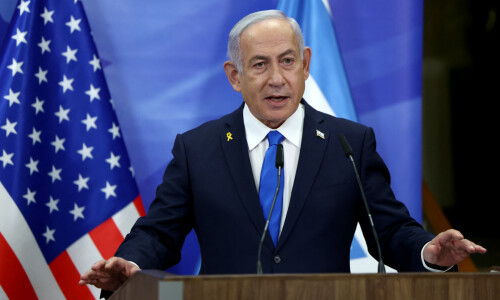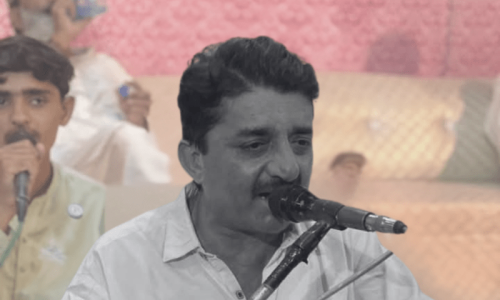
In the Language of Remembering: The Inheritance of Partition
By Aanchal Malhotra
HarperCollins, India
ISBN: 978-9354898914
756pp.
School textbooks — perhaps the most powerful tool through which personal and public history is passed down generations — invariably carry the guilt of having been penned from perspectives that defy human emotions.
Anyone who went to school in the last 75 years in Pakistan or in India will have a very textual reference to the 1947 division of the Subcontinent: they will mention the Radcliffe Award, the largest migration in recorded history, the displacement of approximately 14 million people and spine-chilling stories of brutal death.
Bifurcating from this point are the individual nationalistic perspectives of historians who have been more adept at drawing the dividing line between ‘them’ and ‘us’, than in bringing to life the aesthetics of that unprecedented divide.
Against this backdrop, Aanchal Malhotra’s ground-breaking work In the Language of Remembering: The Inheritance of Partition is objective literature that rises above partisan subjectivity, to commemorate those basic emotions that feature absolutely nowhere in recorded history.
A ground-breaking work is objective literature that rises above partisan subjectivity
With a collection of those unarchived, complex, emotional undercurrents, Malhotra documents what she calls “the vocabulary of Partition”, but this is not your run-of-the-mill sob story detailing the violence of the times — that unfortunate, animalistic reality that has misrepresented the highly complex emotional and ethnographic landscape of Partition.
Sentiments of regret, love sacrificed or safe-kept, friendships lost and yearned for, and memories happy as well as hateful were not registered as was their due. They were not conversed about despite being lived experiences.
Born of those experiences is a vocabulary that proves undeniably that, even today, Partition is not an event of the past. Its emotional legacy is threaded into our daily lives, even as the generation that witnessed it first-hand is now almost gone, or is in its twilight years. Partition has been systematically, surreptitiously, individually and collectively passed down to the second, third and even fourth generations. Who knows how many more generations will pass before closure finally comes, if it ever does.
Herself a child of Partition memories, courtesy two sets of grandparents who had crossed over to India from Dera Ismail Khan and Lahore in 1947, Malhotra candidly admits that her book — a sequel to her earlier work Remnants of a Separation: A History of the Partition Through Material Memory — was born of a personal curiosity about the generational inheritance of Partition.
The journey started almost a decade ago when, as a graduate student, Malhotra began speaking to eyewitnesses of that world-changing event. Her search led to the discovery that there existed an extraordinary tapestry of Partition memory, collectively embroidered by at least three generations who wanted to speak the language of that weave, but were never invited to. They carried that vocabulary within themselves as precious mementoes, as heavy burdens. Thus, her only source for soothing the ruffles in the texture was a fractured history spread across the globe.
Methodologically, Malhotra built conversations and conducted interviews — face-to-face, telephonic or online. She gained inroads into mind maps at risk of erasure, one disclosure leading to another. She saw her subjects — even third-generation hoarders of memory — weep tears of grief and delight and likewise she wept herself, feeling the visceral nature of memories manifest both in speech and silence, in loss and love, in bitterness and compassion. She must be credited with admirable emotional camaraderie, to have weathered it all and to have brought out the delicacy of those sentiments.
Malhotra’s text is based not on geography, or religion, or nationality, but around diverse sentiment. The book is a heavy read, demanding patience and compassion as one moves through chapters that are thematically categorised and yet overlap with recurring themes: the search for one’s ‘beginnings’; the helplessness of inaccessibility to ancestral land and hence the ‘refugee’ identity; the feeling of a land in sight, but definitely unattainable; the desire to travel to the ‘other’ side and perhaps get hold of one concrete piece of evidence of the original identity; the everlasting need ‘to belong’ to something deeper than name or place.
Also heavily laced in the text is the perplexing, tyrannical and bewildering nature of the Radcliffe Award that created unexpected ‘borderlands’ whose reality was beheld only days after it was made public, people waking up one day confused of their standing in the new international divide.
Imagine the pathos of being “tucked away in a corner of an overcrowded train” to suddenly discover that “we had quietly become Pakistan.” One cannot deny the ache, even generations later, coming from the anger of not having been told that one was unknowingly leaving one’s home behind.
One of the strongest emotions in Malhotra’s book is the separation and splitting of family, yet so many of her later-day Partition children do not look at the event with distress, but with awe and pride. These inheritors of Partition memories feel the pull of newly discovered family members residing on the other side of the international border. They remain members of the same family, but the strange geography of a construct drawn by a foreign administrator makes them unapproachable.
There is the migrant couple from western Punjab that moved to Delhi and continues to speak Punjabi, even though Hindi-dominated Delhi has been their home for the past 75 years. There is the young historian, born post-Partition and based in the United Kingdom, who ‘returns’ to ancestral culture and lifestyle through inherited memory. There are all those second- and third-generation interviewees who are afraid of the ‘erasure’ of their personal histories.
Fear, too, emerges as a strong subliminal, physical, palpable and instinctual emotion, hidden deep in the genes of subsequent generations — sleeping with a knife under her pillow, one Partition grandmother inadvertently passed her emotional insecurity to a grandchild.
Malhotra’s greater achievement is that she moves beyond the violence of Partition to put together a language not of rupture, but of unity, through those ubiquitous emotions that are common human heritage. Of course, memories of brutality lurk large in the conversations but, amazingly, they have become factors inciting friendship, love and hope, regret and grief.
Deafening silence takes the form of softer words, developing the vocabulary born of the inexplicable presence of a No Man’s Land between the two countries.
Also recorded is the emotional baggage of third-generation children, faithfully conserving mementoes, such as in the ‘Lahore Room’ of a private bungalow in central Delhi, because they have a feel for the lost history, the lost syncretic culture. Because in these ways, they can answer the question ‘where are you from?’.
Malhotra’s book serves as a time capsule for posterity as it touchingly portrays the psychological aspects of having to abandon home and hearth under duress. But it’s not a tale of woe, relatable only to those who lived the experience; it is a beautifully rendered account that will resonate even with those who have never had to undergo the throes of severing ties with their soil.
They will come to the more mature understanding that severance from land is an emotional keepsake that defies all material loss. That, although lived experience is dated, its inheritance seeps — at times effortlessly — down generations. For these generations, the delicacy of those emotions remains, nay is strengthened, as a debt of honour, to be conserved as a legacy.
Speaking as one whose forefathers had material and emotional stake in Partition, Malhotra’s book turns back the pages of history at a more humane level. Overcoming the temptation to hark back to the geography of that once undivided Subcontinent, she has successfully built a fluent fabric of human connections that far outweigh the animosity being imposed by people who never went through the throes of ‘not belonging’.
The reviewer is a freelance journalist, translator and creative content/ report writer who has taught in the Lums Lifetime programme. She tweets @daudnyla
Published in Dawn, Books & Authors, October 9th, 2022

















































Dear visitor, the comments section is undergoing an overhaul and will return soon.